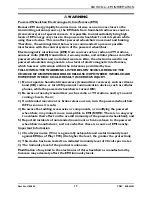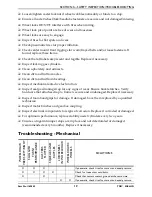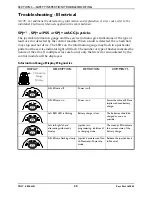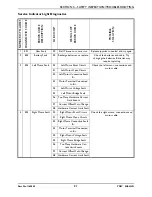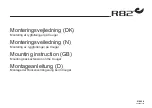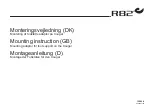
SPECIAL NOTES
6
SPECIAL NOTES
Signal words are used in this manual and apply to hazards or unsafe practices which
could result in personal injury or property damage. Refer to the table below for
definitions of the signal words.
NOTICE
THE INFORMATION CONTAINED IN THIS DOCUMENT IS SUBJECT TO
CHANGE WITHOUT NOTICE.
WHEELCHAIR USER
As a manufacturer of wheelchairs, Invacare endeavors to supply a wide variety of
wheelchairs to meet many needs of the end user. However, final selection of the
type of wheelchair to be used by an individual rests solely with the user and his/her
healthcare professional capable of making such a selection. Invacare highly
recommends working with a certified rehab technology supplier and/or a member
of NRRTS or RESNA.
WHEELCHAIR TIE-DOWN RESTRAINTS AND SEAT RESTRAINTS (TRRO OR
TRBKTS)
TRRO includes four factory-installed transport brackets and a wheelchair anchored
pelvic belt. TRRO has been crash-tested in accordance with ANSI/RESNA WC Vol 1
Section 19 Frontal Impact Test requirements for wheelchairs with a 130 lb crash
test dummy, which corresponds to a person with a weight of 125 to 165 lbs for
Junior seat sizes or a 168 lb crash dummy, which corresponds to a person with a
weight of 168 to 300 lbs for Adult seat sizes.
TRBKTS includes four factory-installed wheelchair transport brackets. TRBKTS has
not been crash-tested in accordance with WC 19. Use these transport brackets only
to secure an unoccupied wheelchair during transport.
As of this date, the Department of Transportation has not approved any tie-down
systems for transportation of a user while in a wheelchair, in a moving vehicle of any
type. It is Invacare’s position that users of wheelchairs should be transferred into
appropriate seating in vehicles for transportation and use be made of the restraints
made available by the auto industry. Invacare cannot and does not recommend any
wheelchair transportation systems.
Refer to Transport Ready Package (TRRO) on page 85 for more information about
transporting the wheelchair.
SIGNAL WORD
MEANING
DANGER
Danger indicates an imminently hazardous situation which, if not
avoided, will result in death or serious injury.
WARNING
Warning indicates a potentially hazardous situation which, if not
avoided, could result in death or serious injury.
CAUTION
Caution indicates a potentially hazardous situation which, if not
avoided, may result in property damage or minor injury or both.

















